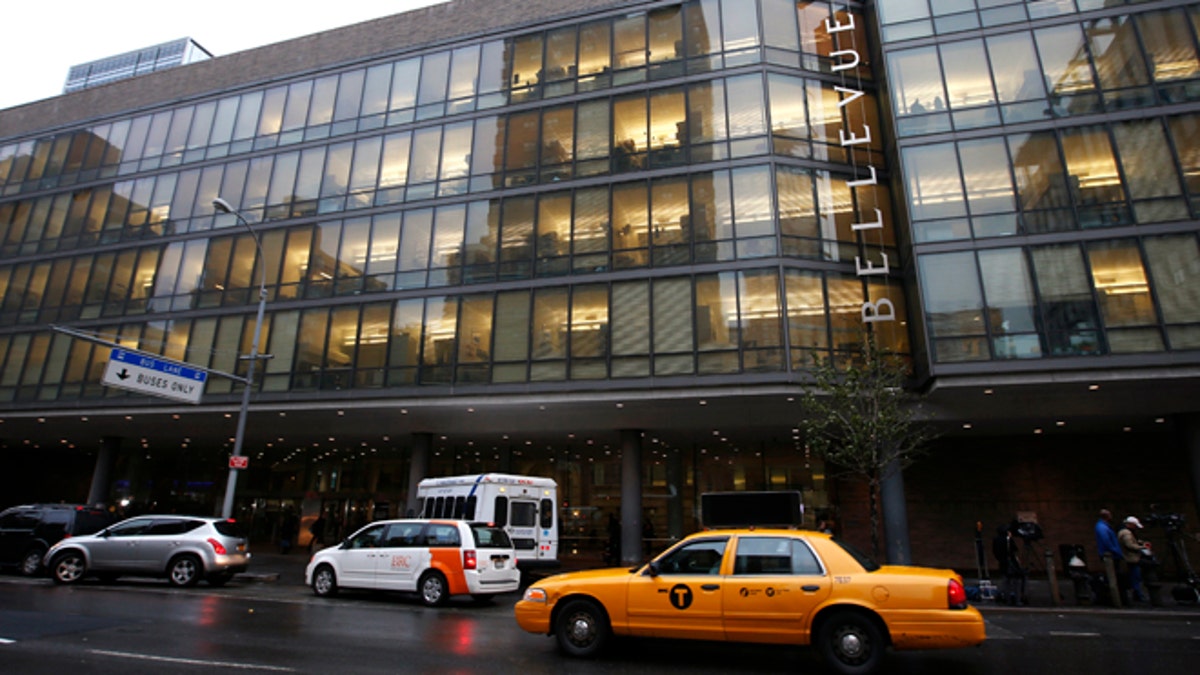
An exterior view of Bellevue Hospital in New York City, October 23, 2014. A physician with Doctors without Borders (MSF) who returned from West Africa recently and developed potential symptoms is being tested for Ebola at the hospital, health officials said on Thursday, setting off fresh fears about the spread of the virus. REUTERS/Mike Segar (UNITED STATES - Tags: HEALTH DISASTER) - RTR4BDYU (Reuters)
New York City's first Ebola patient is prompting frightened staffers tasked with his treatment at the city-run hospital in Manhattan to call in sick, according to a published report.
The New York Post reported Saturday that an "extraordinary number" of Bellevue Hospital staffers took a sick day Friday rather than treat Dr. Craig Spencer. And those who reported for work were petrified at having to enter his isolation ward, the paper added, citing sources.
"The nurses on the floor are miserable with a 'why me?' attitude, scared to death and overworked because all their co-workers called out sick," one source told the Post. "One nurse even went as far as to pretend she was having a stroke to get out of working there, but once they cleared her in the ER they sent her back," the source also told the paper.
But a spokeswoman for the public hospital denied there was any sickout. Ana Marengo told the Post the nurses treating the Doctors Without Borders volunteer are working in teams of two, "with one serving as a buddy watching the other."
The Post said Spencer, who is in stable condition, has been playing an active role in his recovery, putting his medical skills to use, lecturing the staff about proper treatment.
"As a doctor, he knows a lot about medicine, so he would call the nurse's station all day and going back and forth the doctors on what to do," the source told the Post.
Spencer is confined to a special room that is pressurized. He has been passing the hours in isolation watching TV and eating hospital food. No visitors are allowed but once his room is equipped with a video camera he’ll be able to Skype with pals.
The report of a sick-out came as both New Jersey Gov. Chris Christie and New York Gov. Andrew Cuomo said Friday they are ordering a mandatory, 21-day quarantine for all doctors and travelers who have had contact with Ebola victims in the ravaged countries of West Africa.
The move came one day after Spencer was diagnosed with the disease after returning to the U.S. a week after treating Ebola victims in Guinea.
The two governors said the case forced them to conclude that the two states need guidelines more rigorous than those of the U.S. Centers for Disease Control and Prevention, which recommends voluntary quarantines.
"It's too serious a situation to leave it to the honor system of compliance," Cuomo said.
A woman who arrived at Newark Liberty International Airport from West Africa developed a fever and was the first traveler to be quarantined under an Ebola watch Friday.
She had no symptoms upon arrival, authorities said. A preliminary test for Ebola came back negative. The woman, a healthcare worker, remained quarantined.
Spencer was traveling in New York City prior to his diagnosis Thursday. Health officials said he followed U.S. and international protocols in checking his temperature every day and watching for symptoms, and put no one at risk. But others said he should have been quarantined — that is, kept away from others, either voluntarily or by the government — during Ebola's 21-day incubation period.
An automatic three-week quarantine makes sense for anyone "with a clear exposure" to Ebola, said Dr. Richard Wenzel, a Virginia Commonwealth University scientist who formerly led the International Society for Infectious Diseases.
Doctors Without Borders said in a statement that a quarantine of that nature would be going too far and that people who contract Ebola are not contagious until symptoms begin.
"As long as a returned staff member does not experience any symptoms, normal life can proceed," the organization said in a statement.
